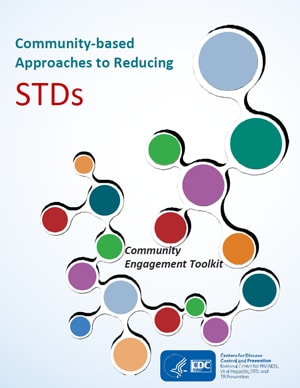Community-Based Approaches to Reducing Sexually Transmitted Diseases
CDC’s Community-Based Approaches to Reducing Sexually Transmitted Diseases (CARS) initiative to enable funded recipients to extend the reach of STD prevention services.
Using community engagement methods and partnerships to build local STD prevention and control capacity, the purpose of the CARS project is to support the planning, implementation, and evaluation of innovative, interdisciplinary interventions to:
- Identify societal issues (e.g., access to quality health care) that contribute to disparities and develop interventions to address those societal issues;
- promote personal health; and
- advance community wellness.
CARS projects accomplish their goals through community advisory boards, collaborative partnerships that leverage provider and community resources and expertise. CARS awardees identify social determinants of health, implement interventions to reduce STDs, and improve health equity. These interventions include enhancing STD and personal health services for adolescent minorities and young adults, including teens, young minority men who have sex with men (MSM), and LGBT youth. All strategies and activities address both individual and structural factors to promote community wellness that will facilitate better public health outcomes (e.g., STD screening coverage of chlamydia, gonorrhea, and syphilis and vaccination for hepatitis A and B, and human papillomavirus).
CARS-Fifth Cycle (Cars Phase 5)
The Division of STD Prevention awarded $3.9 million for a funding cycle from September 30, 2023, through September 29, 2026, to the following organizations:
- Public Health Management Corporation (Philadelphia, PA);
- Asian & Pacific Islander Wellness Center, Inc. (San Francisco, CA);
- Community Health Councils, Inc. (doing business as Rising Communities (Los Angeles County, CA);
- AltaMed Health Services Corporation (Los Angeles County, CA);
CARS-Fourth Cycle (Cars Phase 4)
The Division of STD Prevention awarded $3.9 million for a funding cycle from September 30, 2020, through September 29, 2023 to the following organizations:
- Cicatelli Associates, Inc. (Jackson, MS);
- City of St. Louis Department of Health (St. Louis, MO);
- Community Health Councils, Inc. (Los Angeles, CA);
- Family Health International, (Durham, NC).
CARS-Third Cycle (Cars Phase 3)
The Division of STD Prevention awarded $3.6 million for a funding cycle that will last from September 30, 2017 through September 29, 2020 to the following organizations:
- Capacity Builders, Inc. (Farmington, NM);
- Cicatelli Associates, Inc. (Buffalo, NY);
- San Diego State University Foundation (San Diego, CA);
- Wake Forest University Health Sciences (Winston Salem, NC).
CARS-Second Cycle (Cars Phase 2)
The Division of STD Prevention awarded $3.6 million for a funding cycle that will last from September 30, 2014 through September 29, 2017 to the following organizations:
- AIDS Foundation of Chicago (Chicago, IL);
- Baltimore City Health Department (Baltimore, MD);
- Public Health Management Corporation (Philadelphia, PA);
- University of Michigan (Ann Arbor, MI).
This overview provides additional information and highlights about the CARS-Second Cycle. CARS Case Stories for Baltimore, Chicago, Michigan, and Philadelphia provide further details on the successes, challenges, solutions, and more.
CARS-First Cycle (Cars Phase 1)
The Division of STD Prevention awarded $5.4 million for a funding cycle that lasted from September 30, 2011 through September 29, 2014 to the following organizations:
- University of Texas Health Science Center (San Antonio);
- Virginia State Department of Health (Richmond City Health District);
- Urban Affairs Coalition / Youth Outreach Adolescent Community Awareness Program (Philadelphia); and
- University of Southern California (Los Angeles)
This overview provides additional information and highlights about the CARS-First Cycle.
For more information about these projects please contact Norman A. Hayes (nhh9@cdc.gov), Public Health Analyst, Office of Health Equity, Division of STD Prevention.

